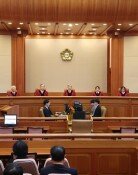Impolite Language by Prosecutors Banned
Impolite Language by Prosecutors Banned
Posted March. 01, 2007 08:00,
The special interrogation division (director and interrogation division head: Kim Tae-hyeon) of the Supreme Public Prosecutors Office decided to impose a heavy disciplinary punishment on Prosecutor Baek in relation to the suspicion that he forced a suspect in the JU case, a case about an illegal pyramid scheme, for harming the dignity of prosecutors by violating interrogation rules by using improper language.
It also decided to discipline division head Kim of the Seoul Eastern Prosecutors Office, a direct senior of Prosecutor Baek, for negligence of guidance and direction and of duty.
Immoderate interrogation, yes, request for false statement, no-
The special investigation team revealed at a briefing this day that, The interrogation method was immoderate and harsh language was used at some point, but it was found that [the prosecutor] did not ask for forged statements.
The most controversial part in the recording made by Kim, a former executive of JU, is the part where Prosecutor Baek said, Tell a lie, to Kim. The special interrogation division explained, From the fact that Prosecutor Baek added the words, That fits the substance, after the problematic comment, it can be interpreted that the prosecutor was asking not for forged facts but for truth.
The division, however, admitted that there was immoderate interrogation involved regarding the suspicion that Prosecutor Baek used coercion to make the suspect confess by hinting to him about possible interrogations in other cases.
Regarding the suspicion that Prosecutor Baek and a number of other colleague prosecutors attempted plea-bargaining with suspect Kim, the special interrogation division concluded that it is not based on truth.
Prosecution Bans impolite language and repeated questions-
The prosecution decided to prohibit prosecutors from using impolite language during interrogations or from repeating questions excessively to suspects or witnesses who deny any allegations. The Supreme Public Prosecutors Office disclosed the amelioration plan was based on customs of interrogation by prosecutors and was based on the aforementioned decision.
The Supreme Public Prosecutors Office also directed other offices to apprise the suspect of the right to refuse statements in questioning him or her, and to pause questioning when the suspect refuses to make statements.
In the long term, the Supreme Office decided to form the Committee for the Deliberation of Interrogations by the Prosecution, made up of figures in various fields to reflect popular sentiment in the interrogation procedures of major cases, including their timing, and arrest, seizure, search, confinement, and indictment policies.
woogija@donga.com





![요양원 321곳 중 85곳 “치매발병후 기초수급자 전락 사례 있어”[히어로콘텐츠/헌트③-下]](https://dimg.donga.com/c/138/175/90/1/wps/NEWS/IMAGE/2025/12/16/132980397.1.jpg)
![태국 환율 왜 이래…범죄자금 유입? 바트화 초강세 미스터리[딥다이브]](https://dimg.donga.com/c/138/175/90/1/wps/NEWS/IMAGE/2025/12/17/132987491.1.jpg)
